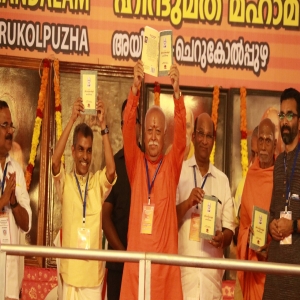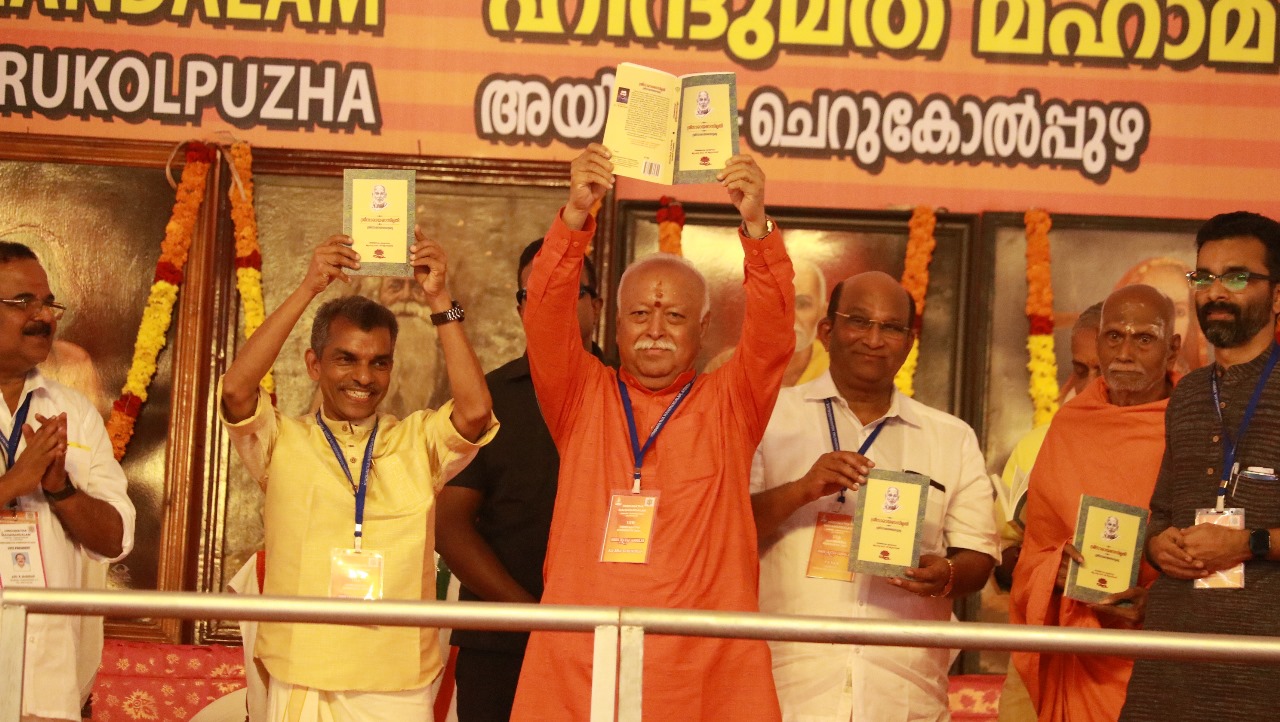
 A. J. Philip
A. J. Philip

Dear Shri Mohan Bhagwat Ji,
I have occasionally written letters to you, though I have received a reply only once when one of your closest associates responded. Initially, he was aggressive, but after exchanging a few letters, he became very friendly and respectful.
I am pleased that you addressed the 113th Hindu Unity Convention held at Cherukolpuzha in Pathanamthitta district, Kerala. My wife's house, located at Cherukole, is just across the river. As you may have noticed, the convention is held on the banks of the Pampa, which is to Kerala what the Ganga is to Uttarakhand, Uttar Pradesh, Bihar, and other states through which it flows.
The Pampa is sacred for many reasons. The famous Sabarimala temple is located in the area where the river originates. Many Hindu, Christian, and Muslim pilgrimage centres are situated along its banks. In my childhood, I used to bathe in the river almost every day, as I lived for a few years at Ranny.
I have one horrific memory. I had not yet learned to swim, and the river was in spate. While bathing, I lost my balance and began drowning. Fortunately, my friend, who was younger than me but a good swimmer, noticed me and dragged me to safety. Had he not acted swiftly, I would not be writing this letter to you today.
Let me confess that I have never had the opportunity to attend the Hindu Unity Convention, though I heard Mata Amritanandamayi's discourse there on television. Her words were so soothing that I thoroughly enjoyed her sermon. It was about love, and I even wondered if an elderly Christian priest was speaking through her. By the way, she was a good friend of the late Metropolitan of the Mar Thoma Church, Philipose Mar Chrysostom.
The Hindu Unity Convention is usually held in the first week of February. You may have noticed that it begins on a Sunday and ends the following Sunday, when, downstream, the Maramon Convention begins, organised by the Malankara Mar Thoma Syrian Church of Malabar. Earlier, the Cherukolpuzha Convention, as the Hindu Unity Convention is popularly known, followed the Maramon Convention.
My grandmother used to take me to the Maramon Convention, which attracted businessmen selling dry fruits, dates, glass bangles, kitchen equipment, agricultural implements, and more. They would set up stalls there and later shift to Cherukolpuzha after the Maramon Convention ended.
I am unsure when exactly the Maramon Convention began following the Cherukolpuzha Convention instead of preceding it. However, it makes no difference, as both conventions are forums to propagate universal truths and religious harmony. The attendees are disciplined, and there has never been a stampede like those at Prayagraj or New Delhi railway station. Nor have police ever been deployed on the convention grounds.
After many years, I was able to attend the Maramon Convention this time. It was the 130th edition. It is often called the "mother of all conventions." It remains the single largest Christian convention in the world. Even today, tens of thousands of people attend, though they can hear the messages from the comfort of their homes anywhere in the world.
I knew you were scheduled to address the Cherukolpuzha Convention, and I wanted to attend. However, on February 6, I had an unavoidable engagement. It was my loss. I tried to compensate by reading everything available online about your speech. I was pleasantly surprised when the Metropolitan of the Maramon Convention quoted you in his inaugural speech.
What compelled me to write this letter are some statements you made at Cherukolpuzha while exhorting Hindus to be better Hindus, as Mahatma Gandhi used to say. You also released a book on Sri Narayana Guru, whom I consider one of the greatest savants Kerala has produced, alongside Shankara, Chattambi Swamigal, and Ayyankali, the Kerala Spartacus.
As the head of the Rashtriya Swayamsevak Sangh (RSS), which virtually controls the Union government and whose cadres fill almost all important political and administrative posts—from the Prime Minister to state governors—you are bound to receive public attention. Therefore, your statements should be meaningful, not ludicrous.
You advised Hindus to wear their traditional dress. I noticed that you wore a stitched kurta over trousers. In fact, the RSS uniform has little to do with Indian traditions; it is more European than Indian. Traditionally, our rishis and sants wore unstitched clothing. Any dress that split the human body, such as knickers, trousers, and underwear, was unacceptable.
I do not expect you to follow Indian traditions of dressing. I am a septuagenarian and do not know what the traditional dress of Keralites was. It largely depended on poverty and caste. Many of my classmates at the Government Primary School in Pathanamthitta wore a towel around their waist. Only a few, like me, wore knickers and a shirt. Most men wore a dhoti and left their chests open. They wore a piece of cloth called kaupeenam (loincloth) wrapped around the waist and groins. We children used to call it the "Indian tie."
My maternal grandfather dressed elegantly in a dhoti, loose shirt, and turban, which only he could tie. He left behind a tied turban, which he wanted to be placed on his head when he died. The point I wish to make is that there was no single traditional dress for Hindus. Lower-caste women were not allowed to cover their breasts and had to organise agitations to gain the right to wear a blouse.
Eventually, the Maharaja of Travancore had to accept their demand. A recent Malayalam movie depicted the atrocities committed against women who sought nothing more than the right to cover their chests.
In Kerala, the first person to buy a car was the Maharaja. The second was a lower-caste individual who employed an upper-caste person to drive it. When he visited a temple, the car was stopped at the gate. The rich man was told he could not enter through the front, but his car could, as it was driven by someone of a higher caste. Now, tell me, what is the traditional dress of Hindus in Kerala?
You also exhorted them to eat only traditional food. But please don't assume that what Malayalis eat today is what they ate 70 years ago. Back then, only the rich and privileged could afford rice. The poor ate tapioca. And don't think that tapioca is indigenous. It was brought by the Portuguese to combat poverty in Kerala. The Maharaja of Travancore distributed its stem among the people.
I don't know what they ate before that; probably roots like yam, mangoes, jackfruit, etc. Of course, fish was available in ponds, rivers, and the sea. They had not even heard of roti. Even rice cultivation began only a few centuries ago. I lived in a village where our neighbours ate only tapioca. Rice was eaten only occasionally, on festivals like Onam. So, sir, what exactly is the traditional food you recommend for Hindus in Kerala?
Imagine if you had been born in China, you would have eaten everything that moves. Today, China is far ahead of India, despite both gaining "independence" around the same time. Mao, Deng, or Xi Jinping never advised their people on what to eat. In Mongolia, where temperatures drop to -60 degrees centigrade at night, people can't be expected to survive on your favourites, vada pav and pav bhaji.
People should not be judged by their food choices. I am told Prime Minister Narendra Modi is fond of imported mushrooms. My information may not be accurate, but let him eat whatever he likes. If someone wants to eat beef, let him eat it. After all, historian DN Jha found that it was widely consumed during the Vedic period. Why do you allow your cadres to threaten those who like beef?
Today, Kerala and West Bengal have the largest per capita cow population in the country because cow slaughter is not banned there. The moment a ban is imposed, farmers stop keeping cows. Do you know a barren cow sells for about Rs 20,000 if not more? How many cauliflowers or okra should a farmer grow to earn that amount? Your campaign against cow slaughter is impoverishing farmers who have abandoned cow-rearing in states like Haryana and Uttar Pradesh.
You also advised Hindus not to speak English. How ridiculous! Keralites travel the world for jobs and business, and their knowledge of English is the key to their success.
Do you know why India excels in information technology? We earn more from software exports than from tea. Our dominance is due to our English proficiency. China, recognising this, began encouraging its youth to learn English to break India's monopoly.
English is a gateway to the world. We write better English than the average Englishman. We have great English speakers like Shashi Tharoor and writers like Arundhati Roy. I once heard of VK Krishna Menon, who won the Lok Sabha elections in Bombay. His English was so eloquent that even the British would have been envious. The best English speaker I ever heard was Swami Ranganathananda, the first Malayali to head the Ramakrishna Mission. Swami Vivekananda had a good command of the English language.
Languages are just a means of communication. Hindi and Urdu were created by British administrators and missionaries because Persian was the official language before them. Who is the greatest Hindi writer? Isn't it Premchand? He died in the 20th century. Tulsidas wrote Ramcharitmanas in the dialect of his time. By comparison, Malayalam is a classical language.
By the way, English is as much an Indian language as any other. Please don't create insecurity among those who learn it. Of course, I would be happy if you focused on teaching Hindi to the millions of illiterate people in the so-called cow belt.
You also made another fantastic suggestion: that family members should meet once a week. No one can object to that. But they should also meet their neighbours, not just weekly but whenever there is happiness or sorrow to share. They shouldn't be divided by the thought that their neighbours belong to another community. More often than not, one can choose their friends but not their neighbours.
And what's this absurd idea of advising people not to travel far? You want them to stay in their native places, leaving only for events like the Mahakumbh, exposing them to risks of many kinds.
This is not the first time Hindu religious leaders have discouraged travel. When Gandhi wanted to go to London for higher studies, he was threatened with losing his religion. One of his close relatives stood by him, otherwise, he might never have become the Mahatma.
Such restrictions have cost the Hindu community dearly. Kerala once had a seafaring tradition, but it was lost due to this narrow-mindedness. I am not talking about ancient history.
I had a teacher, Vishnu Narayan Namboothiri. After retiring as a Malayalam professor, he took up work as a priest at a temple in Thiruvalla. Some conservative Hindus like you objected. Why? Because he had "lost his religion" when he travelled to London. This happened in Kerala in the late 20th century.
So tell me, do you want Hindu society to remain as you preach, or do you want Hindus to excel in all fields, regardless of caste and creed and adopt the scientific temper as the Constitution mandates? Thank you for your patience in reading this rather long letter. I appreciate your time and hope you will reflect on these points with an open mind.
Yours, etc.